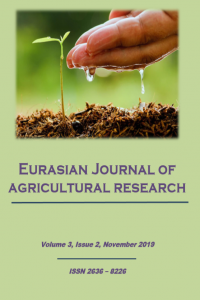Abstract
References
- Aydın M.E., Aydın S., Bedük F., Tekinay A., 2015. Use of Wastewater in Irrigation: Persistent Organic Pollutants in Soil and Product. Journal of Uludag University Faculty of Engineering, 20(2).
- Bedbabis S., Trigui D., Ahmed C.B., Clodoveo M.L., Camposeo S., Vivaldi A.G., Rouina B.B., 2015. Long-terms effects of irrigation with treated municipal wastewater onsoil, yield and olive oil quality, Agricultural Water Management, 160: 14–21.
- Chen Y., Wang C., Wang Z., 2005. Residues and Source Identification of Persistent Organic Pollutants in Farmland Soils Irrigated by Effluents from Biological Treatment Plants. Environment International, 31, 778 – 783.
- Filibeli A., Yüksel N., 1994. Assessment of wastewater potential for agricultural irrigation water needs. Gökova Bay Environmental Problems and Environmental Management Symposium., 139–152
- Hussain I., Raschid L., Hanjra M.A., Marikar F., Van der Hoek W., 2002.International Water Management Institute. Wastewater use in agriculture: Review of impacts and Methodological Issues in Valuing Impacts, Colombo, Sri Lanka, Working Paper 37.
- Jouyban Z.,2012. The effects of salt stress on plant growth, Technical Journal of Engineering and Applied Sciences, 2(1), 7-10.
- Luprano M.L., De Sanctis M., Del Moro G., Di Iaconi C., Lopez A., Levantesi C., 2016. Antibiotic resistance genes fate and removal by a technological treatment solution for water reuse in agriculture. Science of the Total Environment, 571, 809-818.
- Ministry of Environment and Forestry,. Communique on Technical Procedures for Wastewater Treatment Plants, Leaving Water Quality for Different Treatment Systems http://www.resmigazete.gov.tr/eskiler/2010/03/20100320-7.htm Date of Access: 2.07.2019
- Özbay İ., Kavaklı M., 2008. Treated Wastewater in Turkey and in other countries Recycling Practices Investigation. Environmental Problems Symposium, Kocaeli.
- Pedrero F., Kalavrouziotis I., Alarcon J.J., Koukoulakis P., Asano T., 2010. Use of treated municipal wastewater in irrigated agriculture. Review of some practices in Spain and Greece. Agricultural Water Management, 97: 1233-1241.
- Pesco, M.B., 1992. Wastewater Treatment and Use in Agriculture. Irrigation and Drainage Paper, No. 47, FAO, Rome. 125 p
- Van Oort F., Thiry M., Foy E., Fujisaki K., Delarue G., Dairon R., Jongmans T., 2017. Impacts of one century of wastewater discharge on soil transformation through ferrolysis and related metal pollutant distributions. Science of the Total Environment, 590-591, 1-13.
Abstract
In this research, the use of waste water produced
after treatment for irrigation purposes was investigated. Clean water resources
in our world are gradually decreasing and water scarcity is experienced in some
countries. For this reason, people turned to domestic water obtained after
treatment. In order to meet the water needs of plants, clean water resources are
needed. The use of potable water instead of drinking water for this purpose
provides a large amount of savings. In this sense, the quality of the water
used is very important. Treatment waters must have certain criteria for use in
agricultural irrigation. Criteria for wastewater from conventional activated
sludge; AKM, BOD and total nitrogen value less than 1 mg / L, the COD value
should be less than 2. Ammonium value should be maximum 0.1 mg / L, total
phosphorus value should be 0.5 mg / L (Çevre
ve Şehircilik Bakanlığı). It is desirable to infect plants with any harmful
substances from outside. For this reason, continuous analysis of the water used
should be controlled.
Keywords
References
- Aydın M.E., Aydın S., Bedük F., Tekinay A., 2015. Use of Wastewater in Irrigation: Persistent Organic Pollutants in Soil and Product. Journal of Uludag University Faculty of Engineering, 20(2).
- Bedbabis S., Trigui D., Ahmed C.B., Clodoveo M.L., Camposeo S., Vivaldi A.G., Rouina B.B., 2015. Long-terms effects of irrigation with treated municipal wastewater onsoil, yield and olive oil quality, Agricultural Water Management, 160: 14–21.
- Chen Y., Wang C., Wang Z., 2005. Residues and Source Identification of Persistent Organic Pollutants in Farmland Soils Irrigated by Effluents from Biological Treatment Plants. Environment International, 31, 778 – 783.
- Filibeli A., Yüksel N., 1994. Assessment of wastewater potential for agricultural irrigation water needs. Gökova Bay Environmental Problems and Environmental Management Symposium., 139–152
- Hussain I., Raschid L., Hanjra M.A., Marikar F., Van der Hoek W., 2002.International Water Management Institute. Wastewater use in agriculture: Review of impacts and Methodological Issues in Valuing Impacts, Colombo, Sri Lanka, Working Paper 37.
- Jouyban Z.,2012. The effects of salt stress on plant growth, Technical Journal of Engineering and Applied Sciences, 2(1), 7-10.
- Luprano M.L., De Sanctis M., Del Moro G., Di Iaconi C., Lopez A., Levantesi C., 2016. Antibiotic resistance genes fate and removal by a technological treatment solution for water reuse in agriculture. Science of the Total Environment, 571, 809-818.
- Ministry of Environment and Forestry,. Communique on Technical Procedures for Wastewater Treatment Plants, Leaving Water Quality for Different Treatment Systems http://www.resmigazete.gov.tr/eskiler/2010/03/20100320-7.htm Date of Access: 2.07.2019
- Özbay İ., Kavaklı M., 2008. Treated Wastewater in Turkey and in other countries Recycling Practices Investigation. Environmental Problems Symposium, Kocaeli.
- Pedrero F., Kalavrouziotis I., Alarcon J.J., Koukoulakis P., Asano T., 2010. Use of treated municipal wastewater in irrigated agriculture. Review of some practices in Spain and Greece. Agricultural Water Management, 97: 1233-1241.
- Pesco, M.B., 1992. Wastewater Treatment and Use in Agriculture. Irrigation and Drainage Paper, No. 47, FAO, Rome. 125 p
- Van Oort F., Thiry M., Foy E., Fujisaki K., Delarue G., Dairon R., Jongmans T., 2017. Impacts of one century of wastewater discharge on soil transformation through ferrolysis and related metal pollutant distributions. Science of the Total Environment, 590-591, 1-13.
Details
| Primary Language | English |
|---|---|
| Journal Section | Articles |
| Authors | |
| Publication Date | November 27, 2019 |
| Published in Issue | Year 2019 Volume: 3 Issue: 2 |


